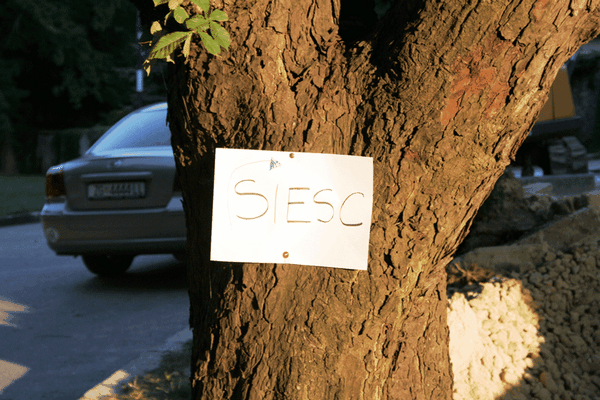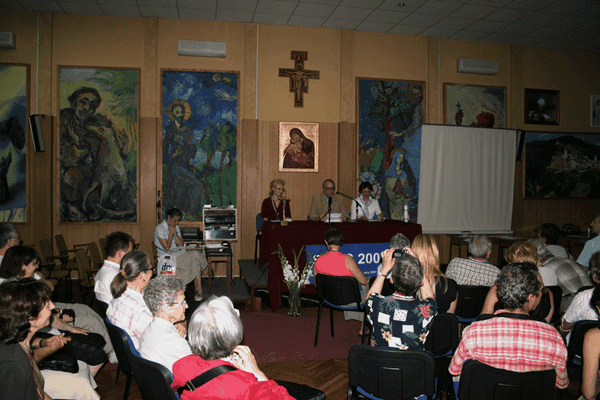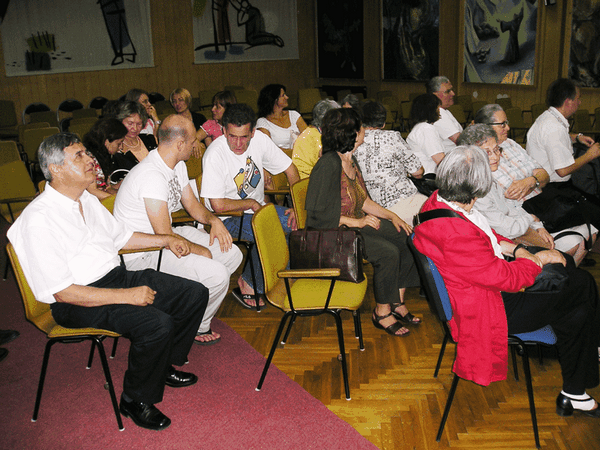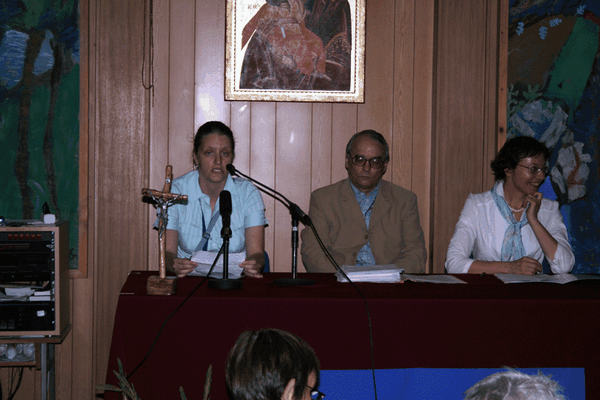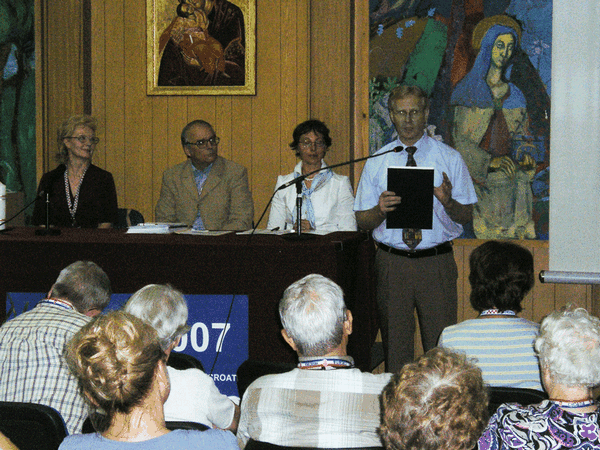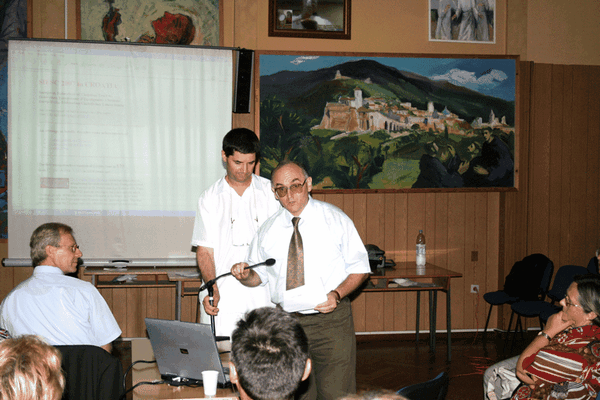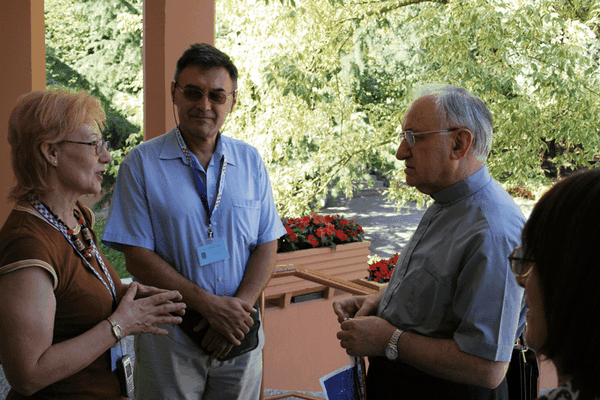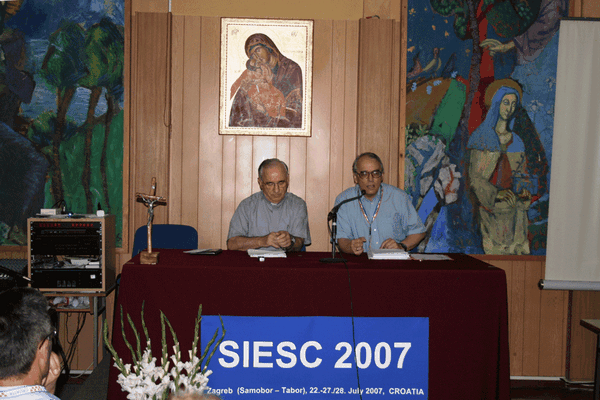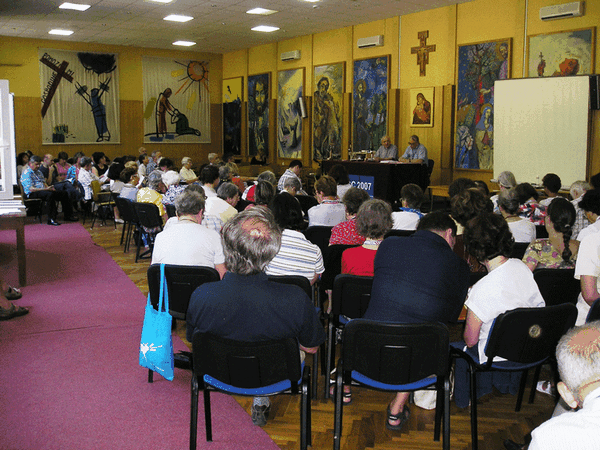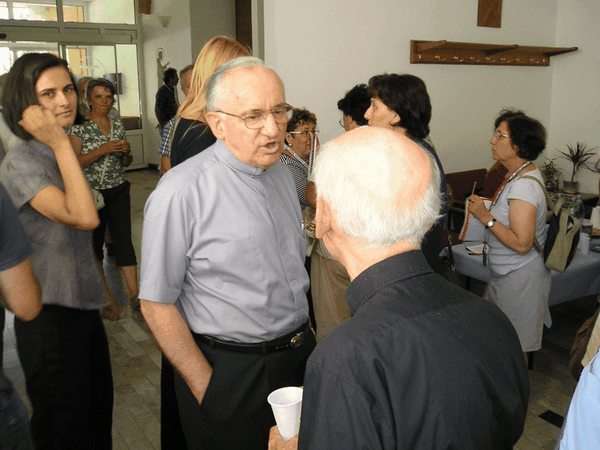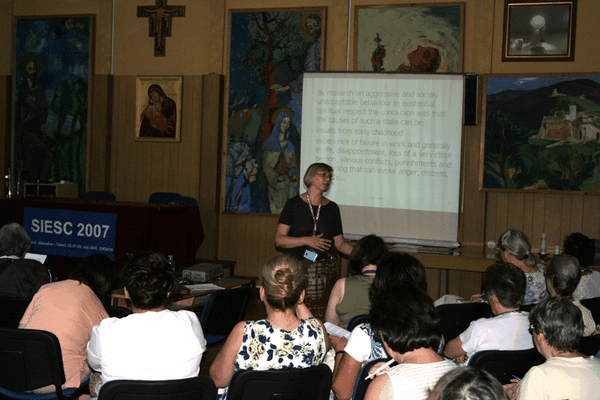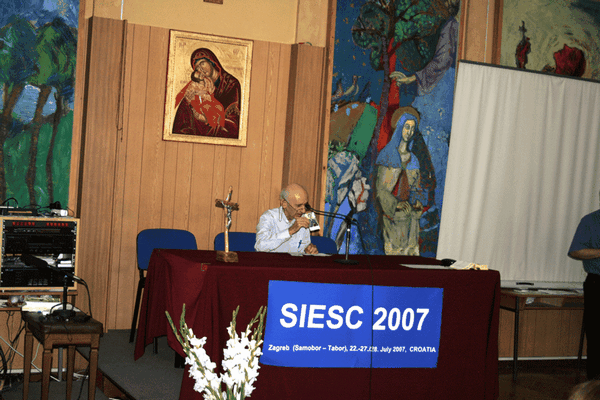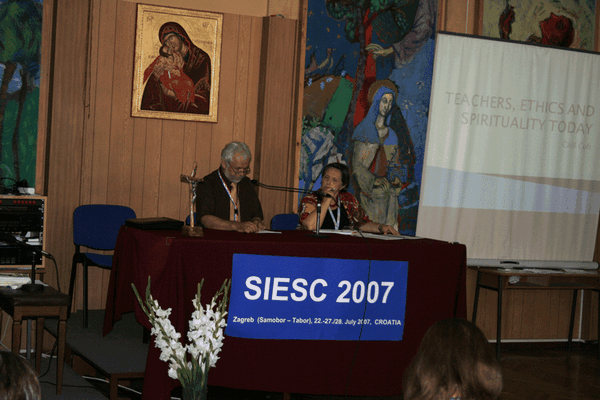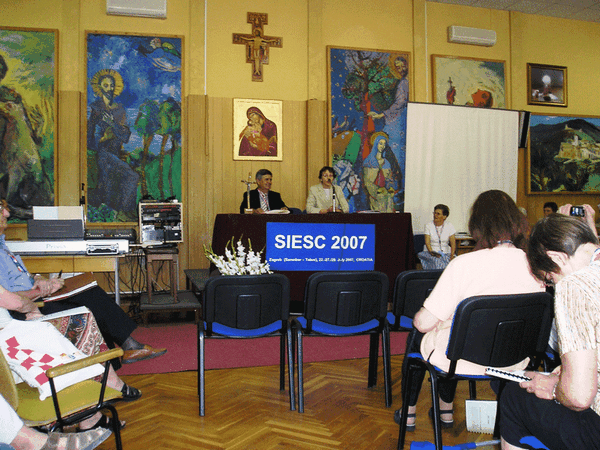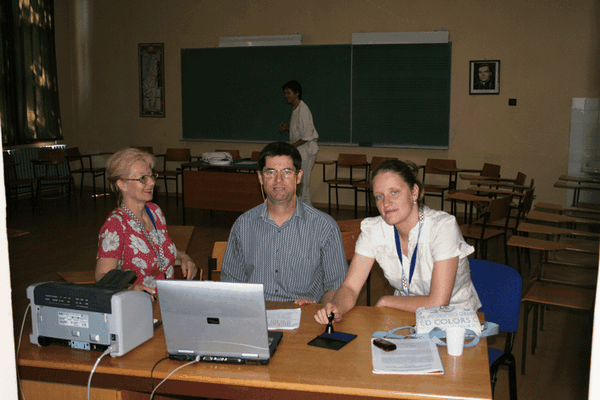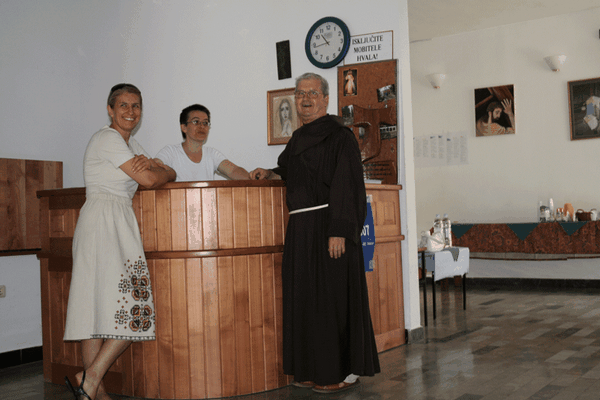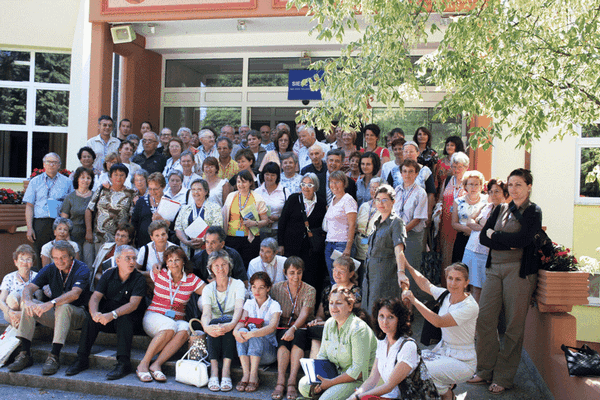Pero Pažin, prof. Centar za odgoj i obrazovanje "Vinko Bek", Zagreb
Odgovornost za riječ europskih kršćanskih učitelja u promicanju duhovnosti
Uvod Poštovane dame i gospodo, uvaženi gosti, sudionici ovog europskoga susreta! Sve vas srdačno pozdravljam! Čast mi je a i radost sudjelovati u radu ovoga susreta: čast jer mu nazoče učitelji iz europskih zemalja koji su odgovorni za odgoj i obrazovanje naše djece i mladeži; radost i odgovornost jer upravo i namjeravam govoriti o našoj odgovornosti za riječ u promicanju kršćanske duhovnosti. Ovo je izlaganje jedna inačica predavanja iz cjelovitoga programa Prevencija agresivnosti u školi i obitelji HKDPD-a koji je odobrilo i financiralo Ministarstvo znanosti, obrazovanja i športa Republike Hrvatske i kojim je educirano više od tri i pol tisuće učitelja, ravnatelja, savjetnika i roditelja. Izlaganje se sastoji od dvaju dijelova: - Od začeća do učiteljskoga poziva
- Naša odgovornost za riječ.
I. 1. Od začeća do učiteljskoga poziva Dame i gospodo, znate li kada započinje pripremanje za roditeljstvo? Začećem naših roditelja, djedova i baka & A kada započinje pripremanje za učiteljski poziv? Začećem naših učitelja i začećem učitelja naših učitelja. Baštinici smo svojih bioloških i duhovnih predaka i to svega dobroga i lošega. Nije s nama započeo svijet, pa s nama i ne završava. Sve se prenosi i nasljeđuje. Svatko je od nas u prilici opredijeliti se i opredjeljivati ili za jedno ili za drugo; hoćemo li se ukorijeniti u kršćanske duhovne vrednote ili u što drugo& Jesmo li i hoćemo li poučavati mlade da su naši korijeni kršćanski ili ih se ne će i ne smije spomenuti ni u Europskom ustavu? Nisu li europski kršćanski učitelji i zato odgovorni?
2. Čišćenje pamćenja Poštovane dame i gospodo, ima li netko među nama da se nije umio? Oprao zube? Otuširao se? Ima li koja dama da se nije barem malo našminkala? Ima li muškaraca koji se nisu svježe obrijali ili uredili bradu? Nismo li odjenuli lijepu odjeću? Nije li nam bilo jako važno kakav će nam biti smještaj? A zašto? Pristojno je. Izražavamo poštovanje. Stječemo dojam o sebi& Ima li netko da nije popio jutarnju kavicu? Čaj? Netko da nije jeo? I tako iz dana u dan: hranimo se i uređujemo. A što je s mentalnom higijenom? Što s emocionalnim umivanjem? A što tek s duhovnom obnovom i životom? Činimo li redovito ono ili ikada što bismo svakodnevno trebali i morali činiti: prvo se mentalno očistiti, emocionalno umiti i duhovno okrijepiti pa tek onda ići drugima � kolegama i učenicima.
3. Od učenika do učitelja Dame i gospodo, pozivam vas na oživljavanje i čišćenje pamćenja od svih negativnosti. Prvo ćemo vidjeti sebe kao učenika, a zatim kao učitelja. Potrebna je vaša suradnja. Mirno sjedi. Potpuno se opusti. Odmaraj se. Budi potpuno siguran da ti se ništa loše ne može dogoditi. Znaj: Bog te drži na svome dlanu. Vodi te za ruku. On ljubi svakoga koji želi biti čista srca. Zato ne boj se, bio prljav ili čist, dobar ili zao. Ponavljam: ne boj se! Mnogi su prošli prije tebe ovom zemljom, netko je svima prokrčio put čineći dobro. "Ne boj se, nisi sam!" Darovan si drugima i drugi tebi. Darovane su ti silne sposobnosti: tjelesne, duševne i duhovne. Darovano ti je naravno, ali i nadnaravno: darovan ti je smisao za život. S Isusom pođi u 1. razred, u prvi dan svoga školovanja. Bio si prestrašen i ushićen. Bilo je radosti i suza. Bilo je i povreda: ružnih riječi, svađa, batina, čupanja za kosu, loših ocjena, kazna. Voljom oprosti svima. Reci: praštam, ali i molim oproštenje. Isuse, stavi svoju toplu ruku na rane i ožiljke i izliječi ih. Neka Tvoja ljubav ispuni sve prostore moga djetinjstva. Ozari svojom radošću moje dječje lice. Hvala Ti! Sjećam se i viših razreda: od 5. do 8. Rastajem se od učiteljice/učitelja. Bilo je i suza. Svako je rastajanje kao i rođenje � bolno. A onda novi nastavnici. Umjesto jednoga sada više lica, novi predmeti i nove teškoće. Postajem broj u imeniku. Sve je više zadaća i loših ocjena, upozorenja, kazna, zabrana, svađa. Pubertet, pobuna, svaki dan isto. Morala/morao sam biti najbolja/najbolji. To je bio silan teret. Bojala/bojao sam se markirati, ali i biti odbačena/odbačen. Nitko me nije shvaćao; svi su tražili samo dobre rezultate, tj. ocjene, a kako mi je, nitko me nije pitao. Bila/bio sam često osamljena/osamljen, tužna/tužan, puno sam željela/želio, a malo se toga ostvarilo. A meni su se sve želje ispunjavale, ali nisam bila zadovoljna. A ja nikako nisam uspijevao: sve je išlo loše, školu nisam volio, bježao sam s nastave, tukao se, dobivao loše ocjene, neispričane sate i batine, ali ništa nije koristilo. Sve je bilo samo gore i gore. Nitko me nije shvaćao. Profesori su bili gnjavatori, aždaje, vještice i slično? A što sada nakon svega? Ne preostaje mi drugo nego da oprostim. O Bože, zar je sve to bilo moguće proživjeti i preživjeti? Bože ljubavi, uđi u sve to i popravi, ja praštam i tražim oproštenje i ozdravljenje. Evo i ja praštam svima: svojim roditeljima, profesorima, kolegama i sebi baš sve. Izmirujem se sa svima, ali i tražim oproštenje od svih, a od tebe, Isuse, molim ozdravljenje. Izmirujem se sa svima. Ne želim biti ni svjesno ni nesvjesno zlopamtilo. A onda završni razred osnovnoga školovanja. Pred izborom sam svoga životnoga poziva. Upisati najbolju školu. Pokazati svima da vrijedim. Uspjeti. Izbor. Upis. Napetost. Skriveni strah i ushićenje. Bunim se protiv autoriteta. Ja postajem centar svijeta. Sve probam: sve se može. I tako prolazim srednju školu. Dolazi matura. Odlučujem: bit ću učitelj. Bit ću bolji i pravedniji od svojih profesora. Upisujem studij. Mislim da sam slobodan i da se sada sve može: kino, disko, veselice, tulumi, propuštena predavanja i rokovi. Dugo studiranje. Ponekad i oskudica, stranputice. Polako su se gubile obiteljske i kršćanske vrednote. Ubijali su i Boga u meni, a ja sam gotovo povjerovao da ga nema. Bio sam nezadovoljan: tražio sam smisao života po različitim predavanjima, tribinama, vjeronaucima, jogi, seansama, knjigama. Bilo je ushićenja, ali i razočaranja. I, konačno, došao je kraj moga školovanja. Iako sam griješio i iako su i drugi griješili, ipak sam sve izdržao. Moj život nije ovisio ni o mojim postupcima ni o postupcima drugih. Netko je i krivim stazama ravno pisao. Sav moj život bio je u njegovoj ruci. Zato sam Mu jako zahvalan. Hvala Ti, ljubavi, Bože, dobroto, za moje roditelje, učitelje, profesore i prijatelje. Hvala im za sve što su učinili za me. Opraštam im sve što su krivo učinili ili propustili učiniti dobro. Vjerujem da su činili što su najbolje znali i mogli. Hvala im! Bože, oprosti im i Ti, molim Te. Ja vjerujem da su činili što su najbolje znali i mogli učiniti. Hvala im za sve! I konačno sam postao učitelj. Počeo sam tražiti posao i doživljavati razočaranja. U komunizmu nisam bio podoban. Molbe i negativni odgovori. Ipak počinjem raditi u školi. Nalazim se na mjestu na kojem sam 16 ili više godina gledao druge. Preda mnom učenici, meni povjereni. Ja sam za njih odgovoran. U prilici sam ostvarivati svoje ideale: biti bolji i pravedniji od svojih učitelja; bolje poučavati i odgajati. A jesam li to činio? Polako zaboravljam da sam bio učenik, da je preda mnom 30-ak nekadašnjih nas, samo još nezadovoljnijih i nesretnijih. Zamijenili smo uloge. Sjećam se dobro prvoga profesorskog dana i riječi: "Jao vama, učitelji zakona, tovarite na ljude terete nepodnosive, a sami ni da bi ih se prstom taknuli!" (Lk 11,46). I zaista se na učenike stavlja prevelike terete. Svatko misli da je njegov predmet najvažniji, da učenik mora znati sve što je u programu i više od toga. Svi od njih tražimo dobre rezultate kao što su drugi tražili od nas, a mi nismo mogli zadovoljiti. Svi zaboravljamo da učenici nisu ni brojevi ni strojevi, da su osobe. Neki su pred nama bezimeni, a kamoli da se nešto više o njima zna. Zaboravljam da sam bio učenik, da mi je bilo teško. No i ja sam kao učitelj ponižen: Učenici me ne poštuju, roditelji podcjenjuju, nadzornici strogo nadziru, poslodavci slabo plaćaju. U opasnosti su moji mladenački ideali: počinjem sumnjati u svoj učiteljski poziv. Pomišljam, kao i mnogi, "pobjeći" iz škole, a tako sam želio biti dobar učitelj. Neki veliki duhovnik držao duhovne vježbe svećenicima o svećeničkom pozivu u trajanju od mjesec dana, a moto je bio: "Ne možeš biti svećenik ako ti Bog nije dao poziv." Kratki nagovori i duge šutnje. Na kraju se ohrabri jedan stariji svećenik i upita: "Oče, što da radimo mi koji smo otkrili da nam Bog nije dao svećenički poziv?" Duhovnik odgovori: "Molite Boga da vam ga naknadno dodijeli!" Jesam li ja kao učitelj otkrio i prihvatio svoj poziv? Mogu li reći: Prihvaćam svoj učiteljski poziv, radostan sam što mi je povjeren tako odgovoran posao, što mogu biti učitelj, odgajatelj, promicatelj kršćanske duhovnosti. Ili molim Boga da mi naknadno udijeli taj poziv? Bože, oprosti mi sve propuste, što nisam bio dobar učitelj, oprosti sve krive postupke, nepravedne ocjene, zajedljive primjedbe. I ja praštam svima i sa svima želim živjeti u istinskom miru. Daj mi, molim Te, da mogu što bolje ostvarivati svoj učiteljski poziv. Znam da, kao što moj život nije ovisio o drugima, tako ni životi mojih učenika ne ovise o meni, no ipak sam odgovoran za svaku riječ i njezine učinke. (Sada ostanimo u kratkoj šutnji uz glazbu i tiho, u sebi, molimo od svih oproštenje i oprostimo svima ako smo još što otkrili te molimo Gospodina da nas ispuni svojim duhom kako bismo mogli čuti, razumjeti i prihvatiti ono što nam govori.)
II. 1. Jesmo li odgovorni za riječ Govoriti o našoj odgovornosti za riječ odgovorno je i obvezujuće jer: "tko u govoru ne griješi, taj je savršen". Zašto? Zato što riječju prenosimo poruku; donosimo mir, ali i nemir; potičemo, ali i spotičemo; izgrađujemo, ali i razgrađujemo; liječimo, ali i ranjavamo; hvalimo, ali i kudimo; te nagrađujemo, ali i kažnjavamo. Bitno je kako mislimo, jer misli postaju riječi; još je bitnije kakve riječi, jer riječi postaju djela; djela, ako ih često činimo, postaju naše navike, a navike postaju i naš karakter. Misli, riječi i djela prelaze i na druge: naše učenike, kolege, roditelje i sve druge. A zar za to nismo najodgovorniji upravo mi, europski kršćanski učitelji?
2. Govor naš svagdašnji Danas se govori mnogo: govori se u obitelji, školi, Crkvi, medijima (može se govoriti o medijskom pljusku), ali se sve manje slušamo, čujemo i razumijemo te sve manje razgovaramo. Kako mislimo riječ? Kako ju čitamo? Slušamo? Kako se pripremamo za govorenje riječi? Činimo li to odgovorno mi, europski kršćanski učitelji? Čujemo li ovaj poziv: "Sine moj, pazi na moje riječi, prigni uho svoje mojim besjedama. Ne gubi ih nikad iz očiju, pohrani ih usred srca svoga. Jer su život onima koji ih nalaze i ozdravljenje svemu svijetu njegovu. A svrh svega, čuvaj svoje srce, jer iz njega izvire život." (Izr 4, 20-23) Stoga budimo svjesni snage riječi i svih njezinih učinaka. Ne prozivajmo druge: političare, novinare, itd. jer su i njih odgajali možda neki kršćanski učitelji.
3. "I nož može promašiti ..." Kada sam čuo meni podrijetlom nepoznatu izreku "I nož može promašiti, a riječ nikada!", mene nije promašila; od tada sam počeo odgovornije razmišljati o riječi, njezinoj snazi, učincima; o govorenju i slušanju riječi; od tada osluškujem i tražim živodajne, pohranjujem ih u svoje srce; otkrivam njihove učinke, a oni su veoma veliki i predvidljivi. Osluškujem i svoj odgovor, otkrivam učinkovitost i zaključujem: što nije dobro meni, ne govorim ni drugima.
4. Da me riječ ne promaši "I nož može promašiti, a riječ nikada!" Da mene i tebe ne promaši prava riječ, treba se dobro pripremati, (umivati se) za slušanje, otvoriti i uši i srce, prepoznati pravu riječ i primiti živodajnu, a zaštiti se od smrtonosnih riječi. �O, ako danas glas mu čujete, ne budite srca tvrda!� � kaže psalmist.
5. Proslov Evanđelja po Ivanu (Iv 1, 1-9) �Kolege, tko je od vas pročitao Bibliju?� To je bilo često pitanje na početku moga studiranja kroatistike 70-ih godina 20. st., dakle u doba komunizma. Tajac. Strah ili nitko nije čitao? Javila se samo jedna časna. I danas bi bilo zanimljivo provjeriti tko čita ili tko je pročitao Bibliju? Na dvama našim skupovima na to je pitanje desetak posto odgovorilo potvrdno. To je bilo presudno pitanje na početku moga studiranja jer sam se od tada počeo za Bibliju zanimati i kao za književno djelo i kao za Riječ Božju. Ona me počela poučavati, mijenjati i odgajati. Poslušajmo nekoliko redaka koji se nalaze i u školskim udžbenicima iz Hrvatskoga jezika u Republici Hrvatskoj: "U početku bijaše Riječ i Riječ bijaše u Boga i Riječ bijaše Bog Ona bijaše u početku u Boga. Sve postade po njoj I bez nje ne postade ništa. Svemu što postade U njoj bijaše život I život bijaše ljudima svjetlo; I svjetlo u tami svijetli I tama ga ne obuze.�" (Iv, 1, 1-9) Dakle, po riječi sve postaje. Ona daje život, svijetli u tami, daje moć da budemo djeca Božja, da budemo sveti. I mi se služimo riječju: njome stvaramo, priopćujemo, pjevamo, molimo, volimo... Po njoj smo i danas ovdje: da nije riječi bilo, ne bi ni nas danas ovdje bilo. Riječ čudesno draška naše uši, stvara predodžbe, veseli nas ili rastužuje, raduje ili žalosti... Mudar je čovjek svjestan snage riječi, pa i odgovoran. Proroci se ponekad opiru govoriti: "Nisam ni prorok ni proročki sin." - kaže prorok Amos. Boje se posljedica i po sebe i po narod. Tko to i od nas ne bi pobjegao od te odgovornosti. Neka kaže netko drugi. Zašto bismo se mi zamjerali? Svatko ima pravo na sve. Sve je dopušteno. Jest, ali sve ne izgrađuje. A Božja riječ kaže: "O, kad bi sav moj narod prorokovao!" Ili preinačeno: "O, kad bi svatko od nas govorio samo istinu!" Ali na to smo i pozvani i poslani. Biblija kaže: "Ljubomoran sam na svaku svoju riječ i ne ću se smiriti dok se meni ne vrati i ne donese ploda." (Iz) I mi smo kao Bog: želimo da i naše riječi donesu ploda. A one ga i donose, ali "kakva sjetva, takva žetva". Riječ je nama, učiteljima u školi, jedino što nam je preostalo, zato smo još odgovorniji. Budni budimo i pazimo što sijemo, tj. što promičemo, jer odgovarat ćemo za svaku beskorisno izgovorenu riječ.
6. Odnos prema Riječi S riječju treba mudro postupati poput Isusa. On poštuje riječ, citira ju, njome se hrani i brani, njome ozdravlja i oživljava. Dobra je riječ najbolji izbor, pa će stoga i reći Marti: "Marta, Marta, brineš se i uznemiruješ, a Marija je odabrala najbolje koje joj se ne će oduzeti.� Njegova Riječ nikoga ne ostavlja ravnodušnim. Govorili su: "Nikada nitko nije ovako govorio!" Ili: "Tvrd je ovo govor, tko ga može slušati!" Ako se zovemo kršćanski učitelji, moramo biti Njegovi učenici pa i naš govor mora biti istinit i buditi istinoljubivost u slušatelja. Mi smo svojim učenicima uzor. A kakav? Morali bismo pitati: "Učitelju, što mi je činiti?�" Odgovorio bi: "Mudro se pripremati za slušanje i govorenje riječi, birati dobre i pohranjivati ih u svom srcu, o njima razmišljati i po njima se očitovati." Jer: "Dobar čovjek iz dobra i blaga srca svojega iznosi dobro, a zao čovjek iz zla srca iznosi zlo. Ta iz obilja srca usta mu govore." Gujin se jezik ne može sakriti. Kakvi smo, očitovat će se. "Tko me ljubi, čuvat će moje zapovijedi (riječi)." To može biti mjerilo i nama da vidimo koliko mi držimo do svoje riječi, ali još više do tuđe riječi. A riječ je sjeme, svjetlo, mač, biser... Pa i kada nam se učini da ništa nemamo, ako imamo Riječ, bogati smo i ljubomorno čuvajmo to bogatstvo.
7. Naše govorenje riječi Mi smo pozvani i poslani govoriti riječ i poučavati. Ponuda je velika: pred nama je život i smrt, radost i žalost, sreća i nesreća, blagoslov i prokletstvo. Pozvani smo opredijeliti se i svjedočiti odgovorno.
8. Riječ u obitelji Obitelj je temeljna stanica odgoja.U njoj započinje sjetva riječi. Tu dijete nauči prve riječi, a plodovi se vide kasnije; ako su oni loši, roditelji se pitaju što je s njihovim djetetom. Dali su mu sve, a što je od njega postalo? A zaboravljaju što su mu govorili, koliko ga puta poslali k vragu, pa on došao po �svoje"; rekli mu: "Ništarijo, ništa nikad od tebe." Pa čemu se čude zato što se to dogodilo. Drugi su strpljivo odgajali svoju djecu, blagoslivljali ih, vjerovali, nadali se i molili. I plodovi nisu izostali. Djeca su roditeljska (naša) slika, a ne mi njihova, oni su roditeljski plodovi. Roditeljska je odgovornost velika, ali je i naša (učiteljska) dužnost pomagati im da ne ostanu u tome sami.
9. Riječ u školi Škola je ogromna njiva, a mi poslenici; đaci tlo, a riječ sjeme. A kako se mi pripremamo za sjetvu? U zadnji tren ustajemo, užurbano se spremamo, u zadnji tren stižemo u školu već umorni i nerijetko ljuti: na vrijeme, gradski promet, svoje kolege, Ministarstvo, vlast ... Onda u razred učenicima koji, ma kakvi da su, nisu krivi za naše stanje. Sve se vidi: njihova je intuicija velika, sve dobro snime pa i uzvraćaju. A zaboravili smo prije dolaska mentalnu i duhovnu higijenu. Ima i onih drugih koji to ne zaboravljaju: ranije ustaju, nađu svoj kutak, "umiju se", pripreme se i radosni dolaze u zbornicu i učionicu. Oni zrače mirom i liječe. Oni shvaćaju da je bitnije u odgajanju za kršćanske vrednote tko sam i kakav sam od onoga što znam. Bitnija je osoba od znanja. A ponekad se i u tome zakaže, pa tako neki učenici rijetko čuju svoje ime. Govorio nam je naš sin: "Neću ići u vrtić!" - "A zašto?" - "Zato što me zovu Pažin, a ja hoću da me zovu Ivan." Nakon drugoga treninga pitamo ga kako je bilo. "Dobro. Trener mi zna ime." A i mi kažemo: "Zamisli samo, zapamtio mi je ime." I moje je ime zapamtio profesor na prijamnom i godinu dana kasnije mojim me imenom zazvao. Ime je naša osobnost. Često u sebi čujem: "Imenom sam te zazvao!" Tko je ovdje bez imena? Bezimeni su zaboravljeni. A koliki su takvi pred nama bezimeni, ali zato imaju nadimke i etikete. Učenici nisu, kao što to nije nitko od ljudi, strojevi: ne moraju sve čuti, sve zapisati, sve znati. Nisam protiv znanja, dapače, ali ima valjda nešto vrjednije i od znanja: "Kada bih sve jezike ljudske govorio i anđeoske, a ljubavi ne bih imao, bio bih mjed što ječi ili cimbal što zveči. Kad bih imao dar prorokovanja i znao sva otajstva i sve spoznanje; i kad bih imao svu vjeru da bih i gore premještao, a ljubavi ne bih imao - ništa sam!" (1 Kor 13, 1,2)
Preinačeno glasi: "Kada bih podučavao vještinom najboljih učitelja, a ljubavi ne bih imao, bio bih samo pametan govornik i simpatičan zabavljač, I kada bih poznavao sve tehnike i ispitao mnoge metode, i kada bih imao toliko obrazovanja da bih se osjećao kompetentnim, a ne bih shvaćao način na koji moji učenici razmišljaju i osjećaju, ne bi bilo dovoljno. I kada bih provodio mnoge sate u pripremanju da ne bih postao napet i nervozan, a ne bih imao ljubavi i razumijevanja za osobne probleme svojih učenika, to još ne bi bilo dovoljno. Učitelj koji ljubi, strpljiv je, dobrostiv; ne sablažnjava se kad mu se ljudi povjeravaju; Ne ogovara; ne obeshrabruje se lako; nije nepristojan, Nego je uvijek svojim učenicima živi primjer Dobrog načina života o kojem govori. Ljubav nikad ne prestaje. Programi? - Zastarjet će! Metode? �- Izmodirat će! Tehnike? - Bit će napuštene! Jer, ograničeno je naše znanje I samo ga malo možemo predati svojim učenicima; Ali ako imamo ljubavi, Onda će i naši napori postati stvaralački I naš utjecaj ostat će zauvijek u životima učenika. A sada ostaju vještine, metode i ljubav - to troje. Ali najveća je među njima ljubav." (Anonimni učitelj s Interneta) Pripremanje (ne mislim na struku) sjemena i polja nikada nije dovoljno dobro; pa ako je i sve dobro, opet svako zrno ne donese ploda, a i oni koji donesu plod, ne donesu jednak. "Iziđe sijač sijati sjeme. Dok je sijao, jedno pade uz put, bi pogaženo i ptice ga nebeske pozobaše. Drugo pade na kamen i, tek što je izniklo, osuši se jer ne imaše vlage. Drugo opet pade među trnje i trnje ga preraste i uguši. Drugo napokon pade u dobru zemlju, nikne i urodi stostrukim plodom." (Lk 8, 5-8) Slabim rezultatima doprinose i mediji stvarajući i izmišljajući afere. No i zaposlenici u medijima bili su učenici nekih naših škola i nekih europskih kršćanskih učitelja kao što će to biti i neki sutra.
10. Govoriti s ljubavlju Ako smo čuli da "I nož može promašiti, a riječ nikada", shvatili koliku snagu može imati riječ, kakvi su njezini učinci, kolika je odgovornost za svaku riječ, što nam je činiti? Da zašutimo? A kako kada smo pozvani i poslani govoriti, poučavati, ali i svjedočiti svojim životom: voljeti sebe, svoj poziv, kolege i učenike. Moramo poučavati, ali se i dati poučiti, osluškivati riječ, birati najbolje, pohranjivati ih u svom srcu, za njima žeđati i gladovati, njima zatrpati sve svoje prostore i čekati vrijeme sjetve. Treba voljeti one kojima govorimo: učenike, kolege, roditelje, ravnatelje. Jednom mi reče jedan propovjednik: "Pozvan sam propovijedati. Ne znam što da kažem." "Pogledaj ih i zavoli, pa ćeš im reći što treba!" Rekao je da je bilo dobro. Riječ izrečena s ljubavlju plijeni, privlači i raduje; sprječava, otklanja i liječi nasilno ponašanje; hrabri, ozdravlja i oživljava; budi, potiče i odgaja za kršćanske vrednote. No, postoji i drugačija "pedagogija" koja slušatelje smatra "kuposovim glavicama" kojima treba "odguditi" svoje, koji i tako ništa ne znaju, ne razumiju i ne slušaju. Mi ovdje nismo "kupusove glavice": gledamo se, slušamo, pozorno iščitavamo svaku riječ; upijamo i prosuđujemo; pazimo da nas naša riječ ne promaši. Nije moguće svaku riječ čuti i u govoru ne pogriješiti, ali se ne treba bojati jer ako s ljubavlju govorimo, slušamo i čitamo: "Ljubav i krivim crtama ravno piše." (portugalska) Stoga hrabri budimo: pažljivo slušajmo i čitajmo riječ; istinski ju živimo, s ljubavlju je, ali i odlučno, govorimo. To Europi treba jer je umorna.
11. Uloga medija u promicanju kršćanske duhovnosti Nekada se govorilo: "Znanje je moć", a danas bi se reklo: informacije su moć. Tko ima u svojim rukama medije, taj je moćan; tko upravlja medijima, taj upravlja i svijetom. Jasno je da su mediji u rukama imućnih i moćnih te da promiču proizvodnju, potrošnju i profit; bučnim i blještavim reklamama zarobljavaju čovjeka; nameću sebičnost, neodgovorno (slobodno) ponašanje, uživanje u svemu "što život pruža", dakle, najcrnji hedonizam. Donose najpotresnije vijesti koje zastrašuju; ponavljaju neistine jer su svjesni da sto puta izrečena laž postaje istinom. Njima nije stalo do istine jer znaju da istina oslobađa, a oni ne trabaju slobodnoga čovjeka jer se slobodnim čovjekom ne može manipulirati. Mediji umjesto kulture života promiču kulturu smrti. Toga se može naći u svim medijima, bili oni državni, javni ili privatni, desni ili lijevi, svjetovni ili kršćanski: svi oni moraju od nečega živjeti. Njihovi su zaposlenici pod jakim pritiskom financijskih moćnika, ideologija ili vlasti. Doduše, neki, idući linijom manjega otpora, i na to pristaju: postaju sluge ideologija i moćnika. Iznimka su neki kršćanski opredijeljeni mediji, ali se njih manje prati zbog njihove tobožnje neaktualnosti i konzervativnosti. Ponekad se stječe dojam da su odvojeni od čovjekova zbiljskoga života. Valja znati da su svi zaposlenici bili učenici naših škola, da su nekima bili učitelji kršćani, pa i neki od nas, da potječu iz kršćanskih obitelji pa, možda, i iz naših. A što smo mi radili? Kako smo ih odgajali i obrazovali? Zar nismo odgovorni?
12. Što i kako priopćivati? Govorna komunikacija jedna je od primarnih čovjekovih potreba. Ona ga nuka da drugoj osobi, skupini ili široj zajednici priopći svoja zapažanja, doživljaje, osjećaje i misli. U jezičnoj komunikaciji svatko bi trebao priopćivati: - ono što on jest: sebe bez uljepšavanja, svoju osobnost, vrednote i drugo, tj. čisto sebedarje;
- čime se bavi: svoju profesiju, otkrića, načine rada, rezultate (bez uljepšavanja);
- znanje koje je stekao tijekom svojeg obrazovanja, svoju dobrotu, istinitost i korisnost, tj. primjenjivost u životu.
Ako se ide obrnutim redoslijedom, nije dobro: znanje napuhuje, pretjerano isticanje vlastitih profesionalnih uspjeha uzoholjuje, a sve to prikriva ono što čovjek jest. Dakle, bolje je biti netko nego imati nešto; komuniciramo onim što jesmo, a dajemo ono što imamo. Odgajati može dobro samo onaj tko jest, tj. netko, a obrazovati bilo kako može svatko. Komunicirati se može na različite načine: privatno i javno, usmeno (govorna komunikacija) i pismeno (pismena komunikacija), kraćim i dužim oblicima komunikacije pa se i odlučujemo za primjerene oblike. Zadržat ću se malo na govornoj (usmenoj) komunikaciji. Cijeli tekst moga predavanja nastajao je, ali ne i isključivo, govornom komunikacijom: slušanjem, upijanjem, razmišljanjem i opredjeljivanjem, a tek kasnije mojim govorenjem, pa, po potrebi, naknadnim zapisivanjem. Dakle, nastajao je u susretima čovjeka i čovjeka, te čovjeka i Boga. Thoureau je rekao: "Knjige treba čitati isto tako pozorno kao što su i nastajale." Tako i ovaj moj tekst može se razumjeti pažljivim slušanjem, detaljnim zapažanjem, razboritim promišljanjem i ne prebrzim zaključivanjem. Svaki se govor, pa i ovaj, razumije u pravom, istinskom, iskrenom susretu kakav bi trebao biti i ovaj naš, a nadam se da i jest. Takvi susreti donose sreću i radost. (Hrvatska riječ sreća dolazi od glagola sretati, sresti.) Da nije bilo susreta u dijalogu, ne bi bilo ni kršćanstva, ni kršćanskih vrednota, ni kršćanske duhovnosi pa ni nas. Sve što je čovjek izumio, sve je dobro pa tako i sredstva priopćivanja. Mi ih se ne bismo smjeli pšlašiti i bježati od njih, već aktivno se njima služiti i u njima sudjelovati, ali im se ne potčinjavati, nego legalno i legitimno u njima promicati vrednote koje živimo i za koje smo se spremni i žrtvovati. Isto tako treba pripremati djecu i mladež za aktivno sudjelovanje na promicanju kršćanskih korijena, jer je Europa bez njih kao tijelo bez duše. U promicanju kršćanske duhovnosti, oživljavanju i ozdravljanju europskoga čovjeka dužnost je europskih kršćanskih učitelja navještati sklad i jedinstvo (unum), dobrotu (bonum), istinu (verum) i ljepotu (pulhrum) i to tako da sve prije odašiljanja propusti kroz tri sita: dobrote, istinitosti i korisnosti. U tu je svrhu poželjno i korisno upotrijebiti sve medije: tiskovne, elektroničke i, pogotovo, Internet. Treba govoriti i pisati bilo to zgodno ili nezgodno, drago ili nedrago nekomu, smetalo ili ne smetalo; veselilo ili ljutilo; kudili nas ili hvalili, svejedno, to je naša dužnost; naše legalno i legitimno pravo jer smo sudjelovali i sudjelujemo u stvaranju i duhovnih i materijalnih dobara pa nas nitko nema pravo izgurati iz njihova korištenja. Još je lošije ako mi sami sebe isključimo po onoj: pametniji popušta. A tko onda vlada?
13. Zaključak: Što nam je činiti? Iz svega što smo ovih dana slušali proizlazi da treba: - svakodnevno provoditi mentalnu, emocionalnu i duhovnu higijenu: čistiti pamćenje od svih negativnosti, izmirivati se sa svima, odnosno oprostiti svima
- svakodnevno preispitivati sebe: kako sam mislio, osjećao, govorio i činio
- misliti, govoriti i činiti samo dobro, istinito i lijepo
- tražiti mudrost kao novu paradigmu školstva
- prihvaćati, živjeti i svjedočiti kršćanske vrednote
- ne prihvaćati nikada da smo nemoćni pred nekim teškoćama,tj. izazovima jer smo djeca Božja i baštinici njegovi
- znati da riječ može prouzročiti, spriječiti i liječiti agresivno ponašanje
- aktivno promicati europske kršćanske korijene i kršćansku duhovnost služeći se svim sredstvima javnoga priopćavanja
- promicati kulturu života umjesto kulture smrti
- biti živi, iskusni kršćanin, nositi i darovati Krista i sebe kristolike, dakle, biti, a ne imati, npr. znanje
- biti svjedoci Isusa Krista jer nam je rekao: "Bit ćete mi svjedoci sve do na kraj zemlje."
A čovjek danas, više nego ikada, treba svjedoke, a ne propovjednike.
I na kraju: Zapamtimo da "I nož može promašiti, a riječ nikad!" Nadam se, dragi prijatelju, da tebe tvoja riječ nije promašila, nego da je pronašla mjesta u tvom dobrom i plemenitome srcu i da će donijeti dobre plodove u svoje vrijeme! Hvala na vašoj pozornosti i strpljivosti!
U Zagrebu, 11.04.2007. Pero Pažin, prof.
|

